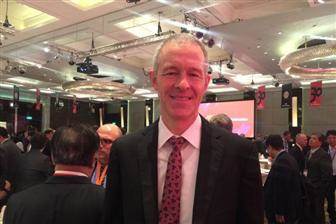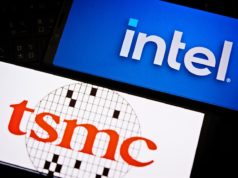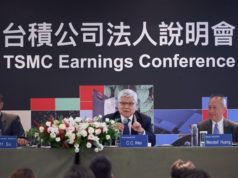
- Register
- Login
22°C
- Article
- . (0)
- Related content
- Company info
Though a business partner of Taiwan Semiconductor Manufacturing Company (TSMC) for less than 10 years, Apple has become the largest customer of the world’s largest foundry house in terms of revenue contribution. But their partnership started out with a home dinner hosted by TSMC chairman Morris Chang for Apple COO Jeff Williams in 2010, when both sides discussed the possibility of cooperating to integrate advanced technologies of both companies to fulfill their respective ambitions, Williams has disclosed.
Williams made the disclosure when speaking at a tech forum hosted by TSMC on October 23 to mark foundry house’s 30th anniversary. He remembered that despite the substantial risks for Apple to bet heavily on TSMC without any contingency plans, both companies decided then to jointly stake on it, and the huge bet has proved a tremendous success.
Under the first deal, Apple contracted TSMC to fabricate all the application processor chips for its iPhone 4 devices in 2010, and the latter invested USS$9 billion and funneled a workforce of 6,000 people into the production of mobile chips at its base in the Southern Taiwan Science Park, successfully starting volume production of “almost perfect” chips within 11 months, according to Williams.
Though declining to disclose Apple’s development plans for the next 10 years at the forum, Williams shared his industrial observations in the past decade. He said that after entering the era of smartphones, the semiconductor sector experienced a tradeoff between computing performance and power consumption, but thanks to technology advancements from TSMC, ARM and others, he believes the tradeoff is no longer necessary.
Williams said that in the next 10 years, the biggest problem lies not in computing performance, but in the lack of sufficient visions to apply new advanced technologies such as AI (artificial intelligence) as well as how to safeguard privacy.
He said Apple has many expectations for AI applications, but what the company needs is neither to make chips with faster computing performance nor to make cars able to fly, but to utilize advanced technologies to change the world, such as making use of semiconductors to achieve medical technology innovations.

Apple COO Jeff Williams.
Photo: Josephine Lien, Digitimes, October 2017
-
Taiwan market: France-based Sugar launches two new smartphones
Before Going to Press | 2h 45min ago
-
China startup receives investment from Intel Capital
Before Going to Press | 2h 46min ago
-
Motherboard makers to see shipments decline in 4Q17
Before Going to Press | 2h 48min ago
-
Taiwan market: China drone maker to set up training center
Before Going to Press | 2h 51min ago
-
Digitimes Research: Taiwan LCD TV shipments to fall 7.2% on year in 4Q17
Before Going to Press | 2h 52min ago
-
Globalfoundries improving EUV mask yield rates
Before Going to Press | 3h 15min ago
-
LED prices under downward pressure on addition of new capacity
Before Going to Press | 3h 24min ago
-
Inductor makers post brisk 3Q17 revenues
Before Going to Press | 3h 26min ago
-
SPIL posts EPS of NT$1.74 for 1Q-3Q17
Before Going to Press | 3h 30min ago
-
Realtek 3Q17 profits hit nearly 3-year high
Before Going to Press | 3h 32min ago



- China AMOLED panel capacity expansion forecast, 2016-2020
This Digitimes Research Special Report examines the China AMOLED industry, focusing on the expansion capacity of the makers, the current implementation plans of major smartphone vendors in the market and the technological hurdles faced by the China makers.
- Taiwan server shipment forecast and industry analysis, 2017
Digitimes Research estimates that revenues from sales of server motherboards, servers, storage systems and related network system equipment by Taiwan-based vendors reached NT$555.8 billion in 2016 and the amount is estimated to grow 5.9% on year in 2017.
- Global notebook shipment forecast, 2017 and beyond
This Digitimes Special Report examines key factors in the notebook industry, including products, vendors and ODMs, that will affect total shipments in 2017 and through 2021.








